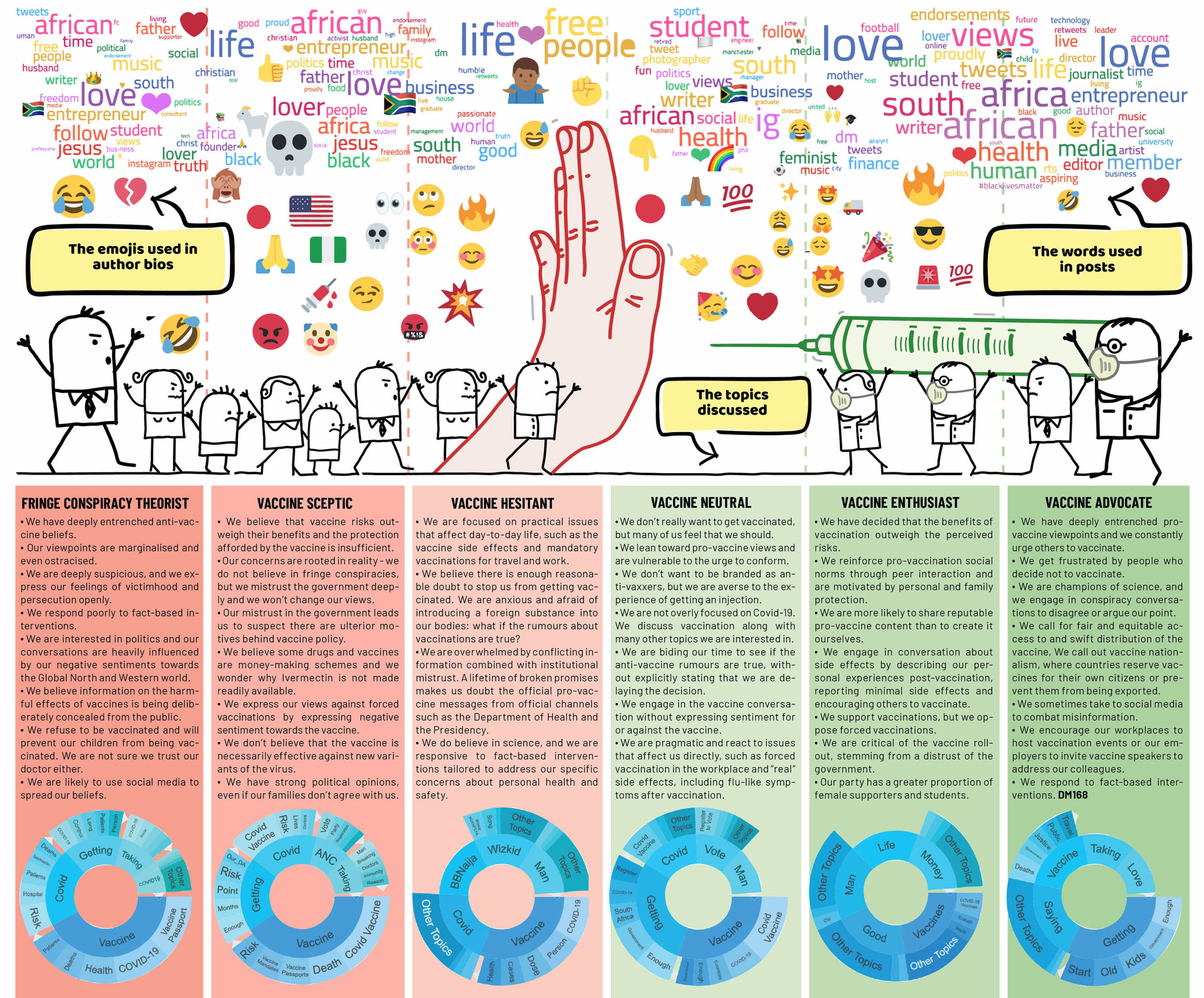The Centre for Analytics & Behavioural Change has analysed people’s comments about Covid-19 on social media in the hope that it can pinpoint ‘sweet spots’ for interventions in six African countries.
First published in the Daily Maverick 168 weekly newspaper.
The Centre for Analytics & Behavioural Change (CABC) at the University of Cape Town used a set of keywords to gather data about the overall vaccine conversation on social media from mid-June to mid-August this year in SA, Ghana, Kenya, Senegal, Nigeria and Tanzania.
The key findings included that accounts with fewer than 1,000 followers authored about two-thirds of the posts containing anti-vaccination hashtags and that the pro-vaccine narrative is driven mainly by scientists, influencers, journalists, business, government and its institutions.
The keywords used were drawn from published reports about social media conversations about vaccines by Unicef South Africa, the African Infodemic Response Alliance (a WHO-hosted network), the Health Systems Trust and social listening reports published by the Risk Communication and Community Engagement SA National Department of Health working group.
The results of the keyword search were geo-filtered to locate their origins in one of the six countries.
The CABC is hoping that the six key segments, their social profiles and their underlying belief structures can be used to pinpoint the “sweet spots” for strategic interventions as each of the six countries in the report grapples with its own vaccination challenges.
Here are the six segments identified in the research study, with the percentage of conversation that each enjoys in the overall vaccination conversation: vaccine hesitant (35.3%), fringe conspiracy theorists (21.4%), vaccine sceptics (20.3%), vaccine neutral (10.3%), vaccine advocates (8%) and vaccine enthusiastic (4.8%).
The CABC also analysed groups of hashtags used to disseminate both pro- and anti-vaccine content on social media platforms. The geo-located data collected from the keyword search and the hashtag analysis were used to frame the conversations into six segments.
The social media posts used for the data set were then affirmed by a crowd-sourcing process in which a group of people were used as a sounding board to ensure that the posts were correctly interpreted, analysed and placed in the correct categories. This crowd-sourcing process was then further verified by random sampling.
The Vaccine Trust Spectrum was built by putting the crowd-verified posts through the CABC’s analytics platform. This process enabled the CABC to identify subnarratives within the greater vaccine conversation and to differentiate positive, negative and neutral sentiment towards the Covid-19 vaccine.
After exhaustive quality control checks, account lists were generated for each segment, enabling the CABC to report on the overall activity of these accounts in an anonymised, aggregated form.
These are the main findings of the CABC report on vaccine conversations in the six sub-Saharan countries (South Africa, Ghana, Kenya, Senegal, Nigeria and Tanzania):
Roughly four out of five authors in this set of posts about vaccination conversations declare their location as South Africa.
The number of authors engaged in the vaccination conversation has been trending upward in Kenya, Ghana and Nigeria – and downward in South Africa, Tanzania and Senegal.
In June, 85% of anti-vaccine posts and 75% of pro-vaccination posts in all six countries came from South Africa. By August, South Africa was responsible for 92% of the anti-vaccination hashtag usage and 78% of the pro-vaccination hashtag usage.
The use of anti-vaccination hashtags has trended downward in Kenya and Nigeria – but upward in Ghana.
Accounts with fewer than 1,000 followers authored about two-thirds of the posts containing anti-vaccination hashtags. These small accounts were responsible for 26% more volume in the anti-vaccine conversation than they were in the total vaccine conversation.
Accounts with more than 10,000 followers contributed only 6% of the anti-vaccine conversation, which suggests that the anti-vax posts are driven mainly by users with small followings.
The pro-vaccine narrative is driven mainly by scientists, influencers, journalists, business, government and its institutions.
Men are more likely to engage in vaccine conversation on social media than women. Anti-vaccine content skews towards male authors and pro-vaccine content skews towards female authors.
The vaccine conversation is a polarised and combative space. Misinformation and disinformation is rife, driven mainly by minority clusters that have an overt distrust of institutions, government, elites and experts. DM168
For the full Vaccine Trust Spectrum report, go to www.cabc.org.za
This story first appeared in our weekly Daily Maverick 168 newspaper which is available for R25 at Pick n Pay, Exclusive Books and airport bookstores. For your nearest stockist, please click here.
Top Reads This Hour




